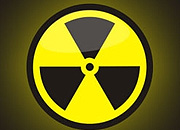The pledge from the Ukraine to send 107 kilograms (almost 236 pounds) of highly enriched uranium and 56 kilograms (about 123 pounds) of spent fuel to Russia by the end of 2012 was hailed by the White House as a major accomplishment.
"This is something that the United States has tried to make happen for more than 10 years," White House spokesman Robert Gibbs said.
Ukraine quickly agreed in the 1990s to give up the approximately 5,000 nuclear weapons it had just inherited upon the breakup of the Soviet Union. But, since then, it has held onto the highly enriched uranium used in atomic weapons — the Hiroshima bomb had about 60 kilograms of highly enriched uranium
Other countries also made announcements to relinquish nuclear material. Canada pledged, for example, to return its spent nuclear fuel to the United States.
Canadian Prime Minister Stephen Harper told reporters Monday, "While all this material is obviously highly secure in Canada, it is our view that the best thing for all countries to do, not just for ourselves, is to return such material to their countries of origin. And so we want to encourage other countries to do so as well."
Before the summit, last month, Chile arranged to return some 40 pounds of highly enriched uranium to the United States that it had obtained 30 years earlier for research reactors. Scholars and analysts expect announcements relinquishing nuclear material from Mexico and South Africa before the end of the conference.
The promises from individual countries to dispose of the nuclear material is contrasted with an overall lack of progress on other nuclear nonproliferation fronts.
For example, Iran, which has been spinning uranium-enriching centrifuges in Natanz over the objections of the international community for more than four years, was not a major agenda item for the summit. Over the weekend, Iranian President Mahmoud Ahmadinejad announced a new model of faster centrifuges.
Iran was a major focus in a meeting Monday between President Obama and Chinese Premier Hu Jintao. The two leaders instructed their aides to develop a common set of sanctions against Iran.
"They're prepared to work with us," White House aide Jeff Bader said.
When given an opportunity Monday at a lunch with reporters, Pakistan's prime minister, Syed Yousaf Raza Gilani, did not say his country would support a fissile material cutoff treaty, an agreement aimed at stopping countries from making nuclear fuel.
The prime minister, however, did say that his country had agreed to follow International Atomic Energy Agency protocols for securing its nuclear infrastructure. Pakistan, a declared nuclear power, has not signed the nuclear nonproliferation treaty.
Kenneth Luongo, co-chairman of the fissile material working group, a nongoverment coalition of scientists and policy analysts created to monitor President Obama's promise to secure all nuclear material in four years, said the summit should be seen as an effort to address nuclear security in a post-Sept. 11 context.
"We are also worried about these non-state actors as part of an improvised nuclear device that can take out a piece of a foreign city," he said.
John Brennan, the top counterterrorism adviser to President Obama told reporters on the sideline of the summit that intelligence data suggested that international criminal gangs had sold bogus nuclear material to al Qaeda, indicating that Osama bin Laden's Islamist terrorist group is eager to obtain nuclear material.
Mr. Luongo said it was significant that the Ukraine made its pledge.
"I think the Ukraine pledge is a major accomplishment. It's not like it is coming out of the blue, we have been talking to them about this for a while."
He added, however, that the announcement "is not going to solve the entire nuclear security problem around the globe, it will solve one piece of it. ... I want to make sure that the commitments made on Tuesday are followed up on Wednesday."
"The Washington Times"
12 Февраля 2026 | четверг | 02:54


